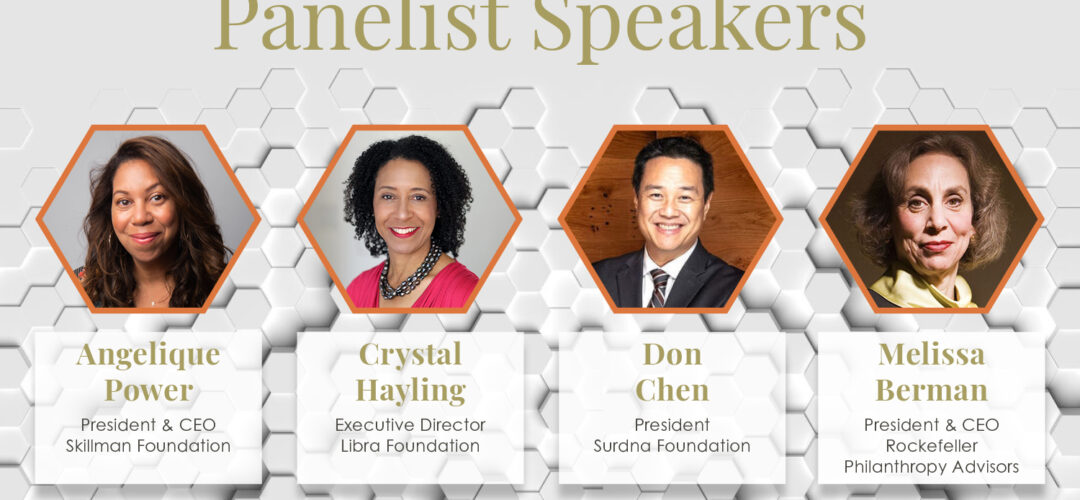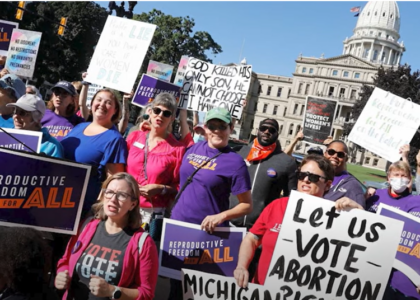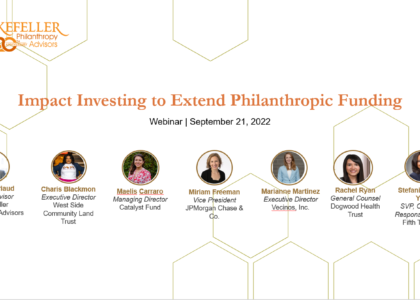Centering People and Communities in Your Giving
May 11, 2023
Webinar Recording and Summary
Amid relentless global transformation, philanthropy needs to shift gears. Centering equity and community involvement are no longer options, but critical imperatives. While the road to true progress remains long, more and more organizations are taking meaningful steps towards reimagining the way they operate to create a more just world.
On May 9, RPA hosted a webinar on Philanthropy’s Role in Creating a Just World: Centering People and Communities in Your Giving to spotlight foundations at the forefront of this reimagination. Moderated by Rockefeller Philanthropy Advisors’ Melissa Berman, the conversation featured Don Chen of Surdna Foundation, Crystal Hayling of the Libra Foundation, and Angelique Power of the Skillman Foundation. This conversation yielded a wealth of insights, which are underscored here by a few standout themes:
A Reimagined Future Driven by Community Wisdom
Building relationships with communities and understanding their perspectives, rather than imposing solutions from the top down was the throughline that weaved the strategies and approaches raised throughout the conversation together. As Surdna’s Don Chen mentioned, this required humility on behalf of foundations and recognizing that communities are the experts on their own experiences and needs. He emphasized that Surdna, “is really taking steps to ensure strategies really reflect the priorities that community leaders, residents, and movement leaders are prioritizing by actually listening.”
One example of this can be found in the Skillman Foundation, which focuses on serving youth and names their first value as “following the will of Detroit youth to dream and design new possibilities together.” This value is operationalized by including Gen Z representatives on a youth council that makes real decisions related to grantmaking. In fact, Gen Z even has a seat at the table on Skillman’s board. Angelique Power said she is, “going to spend the rest of her career moving obstacles out of their way getting capital to them so they can fix the very old problems that we have created and not been able to fix.” The Skillman Foundation’s dedication to co–creating with Detroit youth exemplifies their commitment to both living out their values and actively ceding power in order to address challenges collaboratively.
Learning is Growing
Learning was another central theme throughout the discussion, encompassing both learning from others by listening and the importance in sharing learnings so others may benefit.
Libra Foundation’s Crystal Hayling shared the way philanthropy can learn from the founding principles of the climate justice movement including, “focusing on bottom up organizing, letting people speak for themselves, centering solidarity and mutuality, building relationships amongst ourselves and commit to our own self–transformation.” These strategies, which have been successfully employed by the climate and environmental justice movement, include the core pillars of what it means to authentically center communities.
In the same vein, Chen shared how Surdna is engaging in self–transformation by questioning why they do everything they do, including reporting. According to him, Surdna asked itself, “what is the purpose of this type of reporting data collection learning? Should we do it at all?” and used some tools from experts equitable evaluation and trust–based philanthropy to speak with those in the field to figure out what is useful. Ultimately, they decided to contribute to sector–wide efforts by co-designing evaluation efforts with field experts and invest in data analysis. Chen emphasized that, by working with others and also sharing their learnings broadly, this process is, “much more of a true partnership and evaluation” that will benefit the sector overall, instead of data collection for the sake of data collection.
Shifting Power Dynamics and Building Trust
Hayling pointed out that shifting power is not only equitable, but it is also pragmatic. By placing power in the hands of the communities served, grantees will be able to enact solutions that are more likely to succeed. The panelists urged foundations to hire staff that reflect the communities they work in, shifting philanthropy’s status quo model of concentrating power with those who already have it.
Additionally, this power shift cannot occur without the trust that must exist between foundations and the communities they serve, as well as within philanthropic institutions themselves. Hayling made the crucial point that “there is no trust–based philanthropy in terms of a foundation working with grantees if you don’t have a board that trusts it staff.” She went on to describe how the board essentially said, “let us relinquish a lot of the decision–making control to the staff because we’ve hired a staff that is primarily people of color people with lived experience on these issues, so let’s allow them to lead the work that we’re doing.” Hayling’s insight on the significance of trust–based philanthropy within the dynamics of a foundation and its staff is important because it spotlights how ceding power can lead to a better understanding of the issues at hand, which will lead to better solutions.
Overall, there are no shortcuts or quick fixes for philanthropy to achieve real progress in centering people in communities. Power pointedly noted that the Skillman Foundation took a year to solidify their organization’s clear definition of racial justice, one of their guiding principles. It took even longer to conduct a racial equity audit to drill down into where “every penny spent has gone for the last three years by race.” This work takes longer because the ways these organizations are reimagining their philanthropy aren’t band–aids—they’re significant strides towards real change. Given that the work is time intense and the need has never been more pressing, the time for philanthropy to broadly adopt the practices raised here is now.
To view a recording of the discussion, click here or the image below. This webinar was the first in a series to highlight important themes in RPA’s upcoming book, Reimagined Philanthropy.




